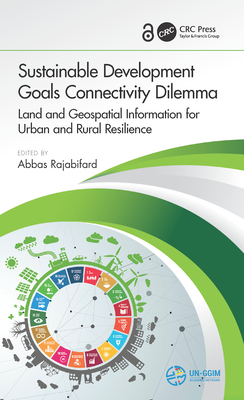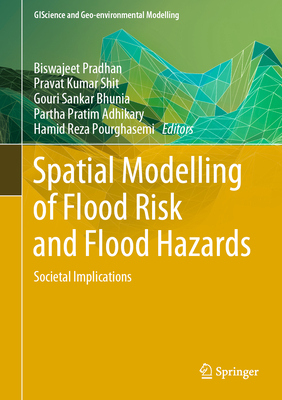GIS and Machine Learning for Small Area Classifications in Developing Countries
暫譯: 發展中國家小區域分類的地理資訊系統與機器學習
Ojo, Adegbola
- 出版商: CRC
- 出版日期: 2020-12-30
- 售價: $5,470
- 貴賓價: 9.5 折 $5,197
- 語言: 英文
- 頁數: 246
- 裝訂: Hardcover - also called cloth, retail trade, or trade
- ISBN: 0367322447
- ISBN-13: 9780367322441
-
相關分類:
地理資訊系統 Gis、Machine Learning
海外代購書籍(需單獨結帳)
商品描述
Since the emergence of contemporary area classifications, population geography has witnessed a renaissance in the area of policy related spatial analysis. Area classifications subsume geodemographic systems which often use data mining techniques and machine learning algorithms to simplify large and complex bodies of information about people and the places in which they live, work and undertake other social activities. Outputs developed from the grouping of small geographical areas on the basis of multi- dimensional data have proved beneficial particularly for decision-making in the commercial sectors of a vast number of countries in the northern hemisphere. This book argues that small area classifications offer countries in the Global South a distinct opportunity to address human population policy related challenges in novel ways using area-based initiatives and evidence-based methods.
This book exposes researchers, practitioners, and students to small area segmentation techniques for understanding, interpreting, and visualizing the configuration, dynamics, and correlates of development policy challenges at small spatial scales. It presents strategic and operational responses to these challenges in cost effective ways. Using two developing countries as case studies, the book connects new transdisciplinary ways of thinking about social and spatial inequalities from a scientific perspective with GIS and Data Science. This offers all stakeholders a framework for engaging in practical dialogue on development policy within urban and rural settings, based on real-world examples.
Features:
- The first book to address the huge potential of small area segmentation for sustainable development, combining explanations of concepts, a range of techniques, and current applications.
- Includes case studies focused on core challenges that confront developing countries and provides thorough analytical appraisal of issues that resonate with audiences from the Global South.
- Combines GIS and machine learning methods for studying interrelated disciplines such as Demography, Urban Science, Sociology, Statistics, Sustainable Development and Public Policy.
- Uses a multi-method approach and analytical techniques of primary and secondary data.
- Embraces a balanced, chronological, and well sequenced presentation of information, which is very practical for readers.
商品描述(中文翻譯)
自當代區域分類出現以來,人口地理學在與政策相關的空間分析領域經歷了一次復興。區域分類涵蓋了地理人口系統,這些系統通常使用數據挖掘技術和機器學習算法來簡化有關人們及其生活、工作和進行其他社會活動的地點的大量複雜信息。基於多維數據對小地理區域進行分組所產生的結果,特別對於北半球眾多國家的商業決策具有顯著的益處。本書主張,小區域分類為全球南方國家提供了一個獨特的機會,以新穎的方式利用基於區域的倡議和基於證據的方法來應對與人類人口政策相關的挑戰。
本書向研究人員、實務工作者和學生介紹小區域分割技術,以理解、解釋和可視化小空間尺度上發展政策挑戰的配置、動態和相關因素。它以成本效益高的方式提出對這些挑戰的戰略和操作性回應。通過以兩個發展中國家為案例研究,本書將從科學角度思考社會和空間不平等的新跨學科方法與地理資訊系統(GIS)和數據科學相結合。這為所有利益相關者提供了一個框架,以便在城市和農村環境中基於現實世界的例子進行有意義的發展政策對話。
特色:
- 本書是第一本探討小區域分割在可持續發展中巨大潛力的書籍,結合了概念解釋、各種技術和當前應用。
- 包含針對發展中國家面臨的核心挑戰的案例研究,並對與全球南方觀眾相關的問題進行徹底的分析評估。
- 結合GIS和機器學習方法,研究人口學、城市科學、社會學、統計學、可持續發展和公共政策等相互關聯的學科。
- 採用多方法方法和初級及次級數據的分析技術。
- 採用平衡、按時間順序和良好排列的信息呈現方式,對讀者非常實用。
作者簡介
Dr. Adegbola Ojo is Director of Teaching and Learning, Programme Leader, and Senior Lecturer in Urban Geography and Applications of Big Data at the School of Geography, University of Lincoln, UK. He received his PhD in Quantitative Human Geography from the University of Sheffield, his MSc in Geographic Information Science from the University College London, and his BSc in Geography and Planning Sciences from the University of Ado-Ekiti, Nigeria. His research interests are focused in understanding and representing social and spatial dynamics and intricacies of population behavior within a framework of Interdisciplinary Studies, Population Geography, Quantitative Social Science, and Computer Modeling. His research activities are grouped around the development and application of small area classifications, geographic information systems and geographic information science for informing public policy. Dr. Ojo has published many monographs and research articles with reputable journals. He has designed and delivered lectures, workshops, seminars, tutorials, practical labs, and assessments to a range of undergraduate and graduate students and working professionals.
作者簡介(中文翻譯)
Dr. Adegbola Ojo 是英國林肯大學地理學院的教學與學習主任、課程負責人及城市地理學與大數據應用的高級講師。他在謝菲爾德大學獲得定量人文地理學的博士學位,在倫敦大學學院獲得地理信息科學的碩士學位,並在尼日利亞阿多-埃基提大學獲得地理與規劃科學的學士學位。他的研究興趣集中在理解和表現社會及空間動態,以及在人口行為的複雜性中,運用跨學科研究、人口地理學、定量社會科學和計算機建模的框架。Dr. Ojo 的研究活動圍繞小區域分類的開發與應用、地理信息系統及地理信息科學,以提供公共政策的資訊。他已在多本知名期刊上發表了許多專著和研究文章。他設計並提供了針對各類本科生、研究生及在職專業人士的講座、工作坊、研討會、輔導課、實驗室實習及評估。






























